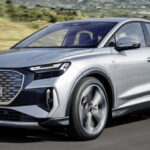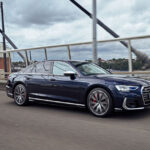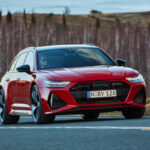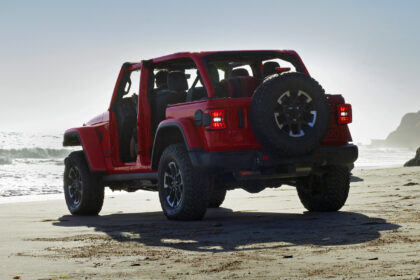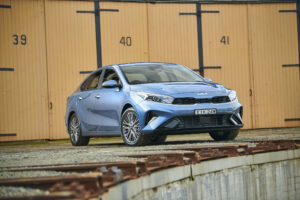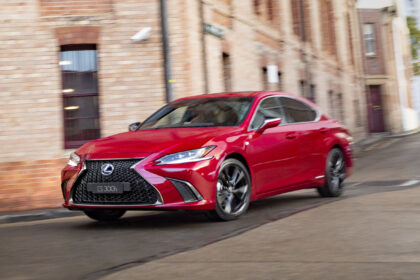
The Audi RS 7 Sportback: think Bruce Springsteen in a Savile Row suit; think Mitchell Johnson in Armani. Like these two men of the moment, the new RS from the German auto maker has power and passion in abundance clothed in some of the best clobber around.
At rest the car looks for all money like a large (more than five metres long with almost three-metre wheelbase), four-door luxury saloon, with just the odd hint of a coupe – low roof line and short overhangs – that might be a bit of a goer.
Press the accelerator pedal and it roars into action, reaching 100 kilometres an hour in just 3.9 seconds. At the recent launch Australian road rules precluded members of the media from experiencing the electronics rein in the car a further 150 clicks around the clock.
This can be stretched out to 280km/h, as in the launch vehicle, or even 305km/h with option packages: a bit of a goer, indeed.

To be fair, I suppose the sharply sloping, chopped off rear-end with boot spoiler lip (Sportback) is a dead giveaway. Other classic sports car markers include distinctive bumpers, partly tinted LED headlights, high-gloss black honeycomb radiator grille and flared sills, not to mention 21-inch alloy wheels in high-gloss black.
Hidden from the onlooker is the fact that the body, with more than 20 per cent made of aluminium, is around 15 per cent lighter than an all-steel equivalent.
The heart and voice of the RS 7 Sportback is the 4.0-litre TFSI twin-turbo V8 engine, built in Hungary, stumping up 412 kW between 5700 and 6600 rpm, with a massive 700 Nm of torque available from 1750 to 5500 revs.
Fuel consumption in the combined urban / city cycle is kept at a class leading 9.8 litres per 100 kilometres by a system that cuts out four of the eight cylinders when the engine is under light load, or at low speeds.
An eight-speed Tiptronic automatic transmission has been matched to engine performance, with drivers able to choose between Drive and Sport modes, or take over changes themselves, via gearshift lever or steering wheel-mounted paddles, with the help of a rev limit warning light on the driver info display.
A quattro permanent all-wheel drive system distributes power between the front and rear axles, from 40 per cent front, 60 per cent rear under normal conditions to give optimum grip when these change. Audi also offers a sport differential, which distributes power between the rear wheels to limit understeer and oversteer on bends.
A specially tuned adaptive air suspension starts by lowering the body by 20 mm, while Audi Drive Select enables the driver to choose how the car travels by altering steering, engine management, the Tiptronic and the sport differential. Modes available are Comfort, Auto, Dynamic and Custom.
In Dynamic mode the stirring engine note is modulated by sound flaps in the RS exhaust system controlled independently from engine load and speed, and the eight-speed Tiptronic’s operating mode. An RS sport exhaust system with black tailpipe tips and an even more distinctive sound is available as an option.
With all systems ‘on song’ the Audi RS 7 Sportback can be reconfigured to conform to a wide range of road conditions and driving styles, or can be left to its own devices to maintain optimum ride and handling.
Steering is responsive and provides sufficient driver feedback to give maintain driver confidence. Brakes are firm to sharp with the driver maybe needing time to adjust. Road noise does intrude into the cabin on courser surfaces but not enough to affect normal conversation between fellow travellers.
Standard equipment includes power adjustable heated RS sport front seats with substantial side bolsters, integrated head restraints, pull-out cushions and embossed RS 7 logos. In the back are two individual sculpted sports seats with integrated head restraints.
An electrically operated boot lid gives convenient access to 535 litres of luggage space which can be expanded to a massive 1390 litres by folding down the split rear seat backs. Straight side walls and flat floor make almost every centimetre usable.
Safety of occupants goes well beyond the driver with a range of systems including adaptive cruise control, side assist and active lane assist, park assist and night vision. Head-up display also projects information onto the windscreen directly in front of the driver.
Getting lost is a thing of the past with the standard MMI navigation plus, which includes a retractable, high-resolution, 8-inch monitor, touchpad control, a 60 GB hard drive, a DVD drive and voice control.
Audi connect plus car phone, supplements MMI navigation plus, letting passengers surf and e-mail freely. It delivers tailored Internet services from Audi connect to the car, including navigation with the Google Earth maps service and Google Street View
In tune with the prodigious engine power of the RS 7 Sportback is that of an optional Bang and Olufsen audio system which puts out more than 1200 Watts of total power through 15 speakers, setting back buyers a Mahler-esque $12,000: say it quietly, it’s not much to pay for near perfect sound.
The Audi RS 7 Sportback pricing starts at $238,500, plus on-road costs. The launch car was optioned with carbon styling, exclusive quilted seating with red stitching, Bang and Olufsen sound and Dynamic Package of steering sports suspension, Dynamic Ride control and 280 km/h regulated top speed lifting the price to $277,800.
Is it worth the price? For those who cannot afford it, no; for those who can, it is value for money.





